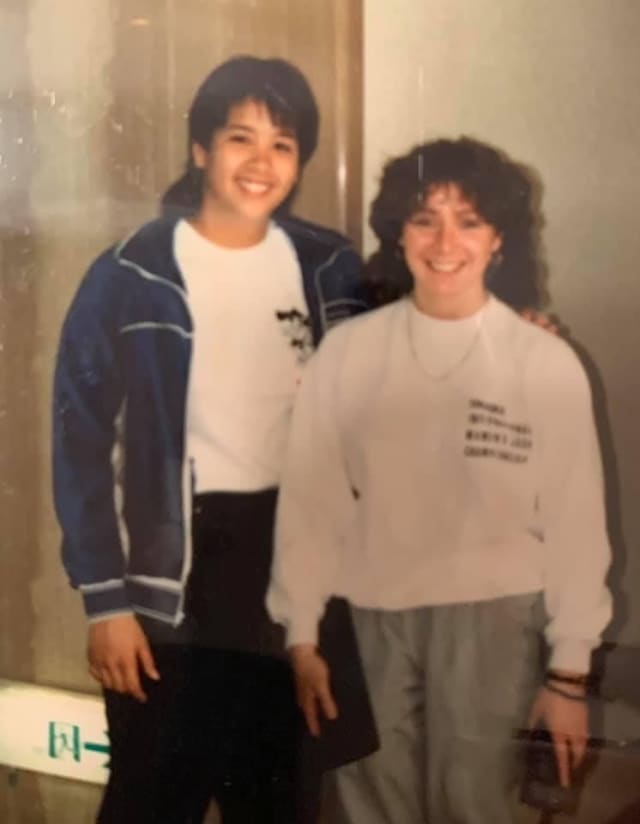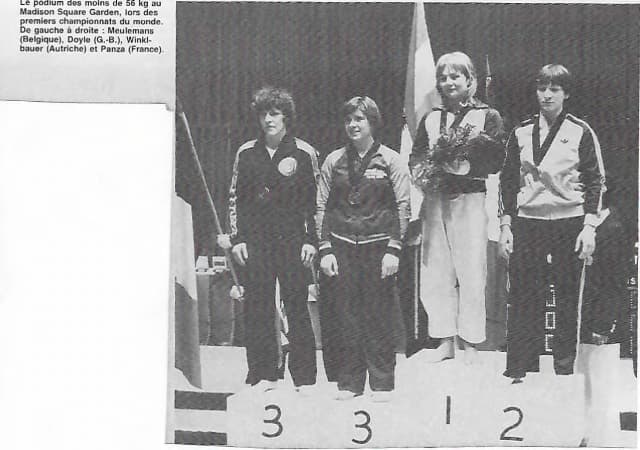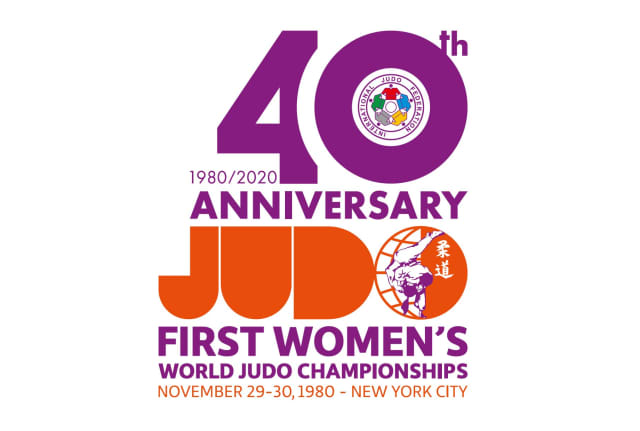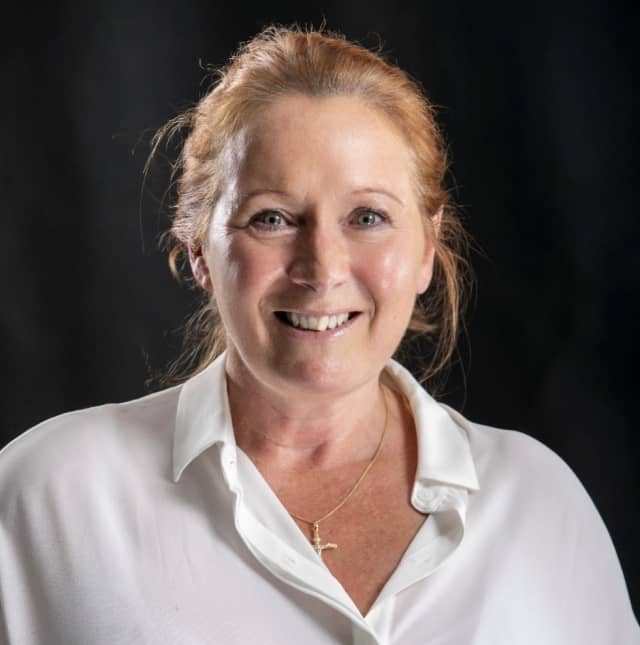"The world is a richer place with women's judo," by Loretta Cusack-Doyle
My reflections on 40 years ago and my bronze medal at the first women's world judo championships in 1980 are those of a naive 17-year old girl; a North Londoner who earned a living on a stall in Islington market during the day, but trained every morning and evening in the sport of judo, which was the love of my life. I was at the beginning of my senior judo life and this was only my third senior international tournament. Here I was about to take part in the first Women’s World Championships, watched globally by millions.
Madison Square Garden, as a venue, announced to the world that women's judo was serious. This venue had hosted the first Muhammed Ali v. Joe Frazier fight and was the home of entertainment superstars ranging from Sinatra to Elvis Presley, Elton John to Led Zeppelin. Nowhere could have been more exciting for a 17 year old girl like me than this place at this time. The event was televised as a 'CBS Sports Spectacular,' not just across the USA but the whole world.
I had just left school with limited academic achievement, but I excelled in sport and physical exercise. Importantly, against all the reasoning of parents and teachers, I had a single-minded obsession to make judo my full-time job. I was told this was an impossible dream, especially for a woman, but this all changed when I met and became friends with the renowned Rusty Kanokogi; the woman whose drive and passion for the sport of judo made this first women's world championships possible.
One cannot write an article about the first world championships without mentioning Rusty and her story is truly remarkable. For me, though, she was more than just a superstar and more than just the sum of the many anecdotal stories that support her unquestionable right to be regarded as a sporting legend. She was a woman I got to know as a friend, who understood me and my aspirations within judo, as a woman. She told me to ignore the doubters and follow my heart and passion. She gave me immense support, encouragement and inspiration with her words and the interest she showed in me. Many believe that Rusty was a classic women's rights activist and indeed, her track record of breaking down barriers for women's judo supported this, but Rusty did not look at it that way, “It had nothing to do with burning your underwear,” she said. “I knew women were ready to compete, so why shouldn’t they have that opportunity?” I felt the same way. I didn’t want to have my full-time job in judo for political reasons, but because I wanted to win and to become the best I could be in my sport. To do so, I had to make a living from it.
Rusty was a Jewish, American New Yorker, who had battled for women's judo for more than 20 years already. In the style of Yentl, the award winning film released in 1983 that starred Barbara Streisand, telling the story of a Jewish girl who had disguised herself as a man to study her faith in Poland in the 1920’s, Rusty did the same thing. By winning the MENS Y.M.C.A. Championships in Utica, N.Y., having entered the competition masquerading as a man, with hair cut short and her chest taped down with bandages. After winning, she openly admitted, when challenged, that she was a woman and was rewarded for her honesty by being stripped of her medal!
Stories like this put things in context and help us better understand the barriers to women's judo at that time. As a competitive sport, judo was largely the domain of men and had been for many years. The belief was that women should not compete in combat sports.
Today, the Women's World Championships are held annually (except in Olympic year), at the same event and location as the men's competition, with the same number of weight groups and the same prize money. It was not always this way. This first Women’s World Championship event was held some 26 years after the first such men's event. It was a separate event held every two years (not annually). It took a further 10 years until it was pulled into alignment with the annual men's event.
It got off the ground through the culmination of the dreams and efforts of many people and organisations around the world. Rusty would be the first to also recognise the support she got from enlightened men in judo at that time, who also wanted to push forward with women's competitive judo.
My GBR National Coach, Roy Inman, had helped to put the UK at the forefront of this movement. I was lucky to be British and compete in the British Women’s Open Judo Championships, which, to quote from the printed first women's world championship programme, "had long been recognised internationally as the highest calibre of women’s competition and had laid the foundation upon which the first women's world judo competition has been built.”
Roy Inman and Rusty Kanokogi worked together to bring the GBR women's team to the USA some 12 months earlier, for the USA Women’s Open in Washington. The GBR women's team then decamped to New York for a week of joint training and demonstration bouts, aimed at promoting the sport for women via every opportunity, photo-call and news event possible.
When it came to signing contracts and securing commitment to get it off the ground, a mention should also be made of the huge barriers that were overcome by the President of the IJF at that time, Shigeyoshi Matsumae. The IJF’s support for the tournament, in the face of hostility from a strong contingent of traditionalists, especially in Japan, was both brave and progressive.
The event was not a particularly successful one for the Japanese fighters, who won just one medal, having been overwhelmed by their larger, better-trained, Western opponents. For women in Japan, judo was largely recreational. After the first women's world championships, a sea-change in attitude in Japan started something big and new and exciting for women and judo. To see where this led one only need look at the Japanese women's team results from the 2010 Tokyo World Championships. 30 years after New York, the Japanese women came away with their best tally ever: 13 medals, 6 of which were gold.
We talk nowadays about the 'judo family' and this stems from those days when judo was truly a very personal, dare I say, elite club of people, who used to compete but also be friends. When the GBR women's team went to the USA to cooperate and work with Rusty, assisting with realising her ambitions for this new ground-breaking event, we did not stay in hotels, but lived with our USA friends, who hosted us in their homes. We competed against them on the mat but they made us feel so very welcome.
In terms of the competition itself, I won a bronze medal. it was my third major International event and I was delighted. I had previously achieved a 7th place at the USA Open, but then went on to get a bronze at my second event, the European Open, so in some ways I thought myself fortunate to be there at all.
The eventual winner of my weight category was the great Austrian, Gerda Winklbauer. I particularly remember her strength and experience. I had fought her in a previous event and she had wiped the floor with me and dumped me out of the running for a medal, but it was a great learning curve and I was then forearmed with knowledge of her unbeatable ne-waza skills. This proved useful when I met her in the semi-final of our weight category. I was determined to stay on my feet and do a series of 'hit and run' attempts at a winning throw. She was seven years older than me and I had belief in my throwing ability, strength and stamina. For such an inexperienced judoka, I managed to complete the contest with my respect intact and Gerda was given the win based on a split decision by the judges. Up to that date, Gerda Winklbauer had won six European Championship medals, including 3 golds, on her pathway to this first Women's World Championships. I was incredibly happy with my bronze against such distinguished competition.
Normally I fought at -52kg but had moved up a weight within the British team, to avoid competing with my friend and British teammate, Bridgett McCarthy, who had secured her slot at this weight with her British Championship gold in July that year. Bridgett also won a bronze at this 1980 world, as part of the five-medal GBR haul, that included the memorable and exciting gold from Jane Bridge in the lightest -48kg category, which was fought first at the event. This set the benchmark for team GBR and was unquestionably inspirational. Dawn Netherwood won herself and GBR a silver at -66kg, having lost narrowly to Edith Simon of Austria. Avril Malley won bronze in the -72kg group, the category where the great French judoka, Jocelyne Triadou, won gold and was a dominant figure in the European Championships. She won European Championship medals every year between 1975 and 1982, with five gold and three silver medals.
Being part of the world of judo and the family of judo is not just about the sport itself. As a young woman, this was the beginning of a career that would take me to every corner of the globe, many times. I remember in New York, this was one of my first experiences of jet lag and experiencing the consequent difficulty with sleeping. Being a Londoner, New York didn’t scare me and I got into a routine of waking up, not being able to get back to sleep and found myself wandering the streets of New York in the early hours. The biggest buzz I got was seeing the huge board of neon lights outside the lobby of the hotel in front of Madison Square Garden. To see this massive announcement of the presence of women's judo in the city was immensely satisfying.
On the personal side, another fond memory was my shopping trips with my teammate and friend, the heavyweight Heather Ford, who was just as excited as I was at the whole experience. We went to Macy’s Department Store to see a talking Christmas tree! We got such a thrill and were totally entertained when this tree talked to us and took our orders for Christmas presents. Our national coach, Roy Inman, was less amused when, at our insistence, he joined us to experience this phenomenon, but sadly the talking Christmas tree didn’t want to talk to Roy and he thought we made it all up for a laugh at his expense.
Women’s judo has never been as strong as it is today and much of this is attributable to the efforts of many within judo, both male and female, 40 years ago, to bring women's judo to the forefront of our sport, with that first Women’s World Championships in 1980 kicking things forward. I am fortunate to be a livestream commentator for the IJF and EJU at magical events like the Worlds, Grand Prix and Grand Slams, all around the globe. I also love the the 'specials' like Paris, Tokyo and Dusseldorf; there is nothing more exciting than watching the ballet-like movement and presence of young stars like Daria Bilodid of Ukraine, the sheer magnificence and strength of Idalys Ortiz of Cuba, the breadth of technical skills employed by Abe Uta of Japan. It's truly a form of art.
The list is endless, but the consistent factor across all women’s international judo, is the level of excellence. My gratitude to the pioneers of women's judo is not just my own but is shared by many millions of women around the world.




